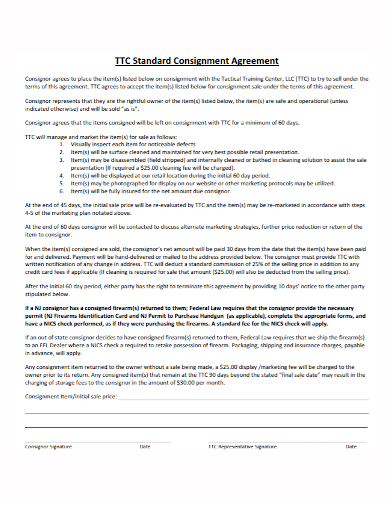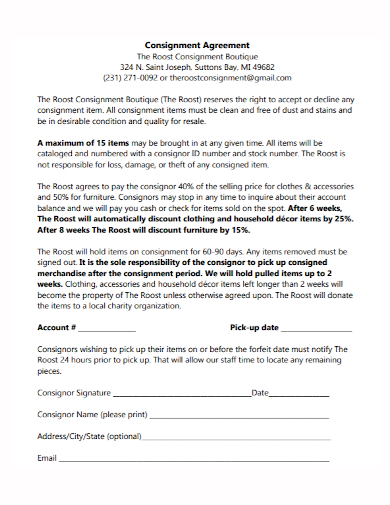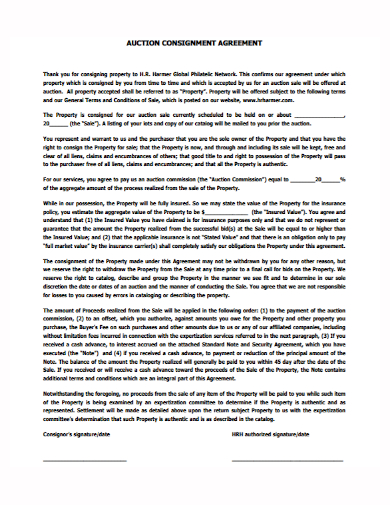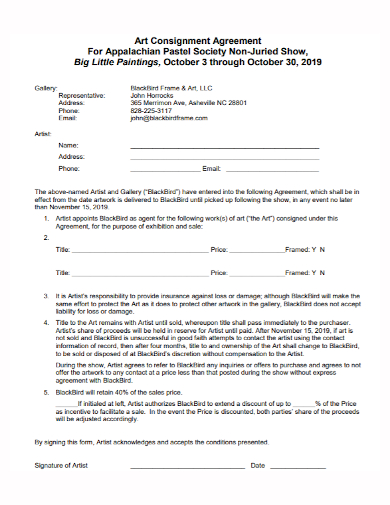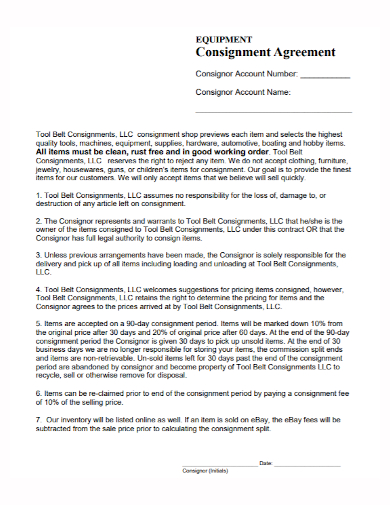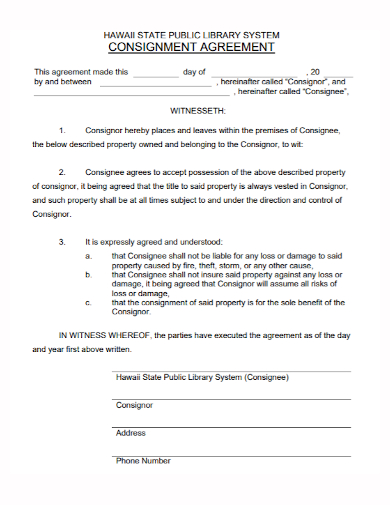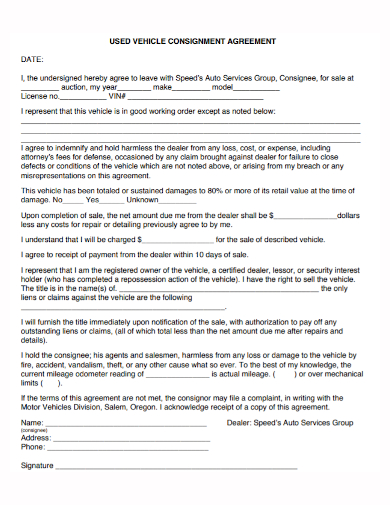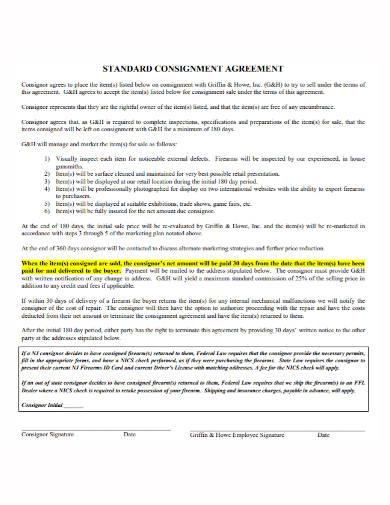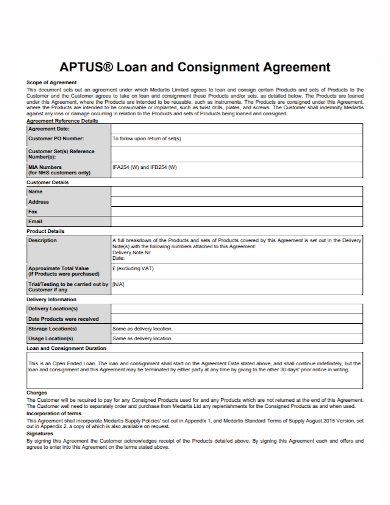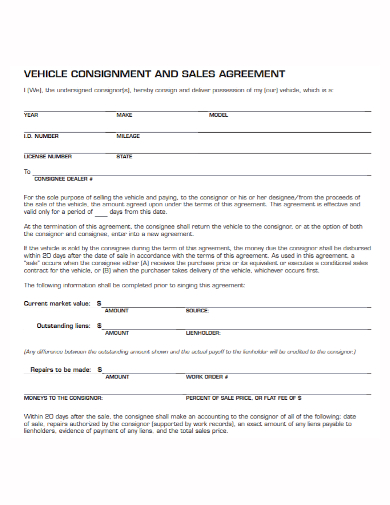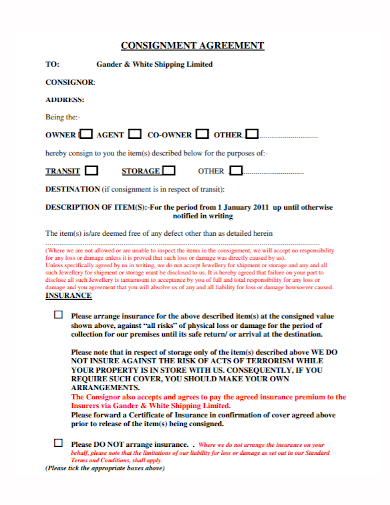Sellers looking for new and expanded wholesale and retail markets for their goods can often benefit from consignment sales. The advantages and disadvantages of using consignment as a selling tool for a small business are discussed in this publication. What happens if a manufacturer creates a new consumer product that is expected to be a hit, but no retailer or wholesaler is willing to invest enough capital to keep a small quantity of the product in stock? How can manufacturers make products and terms of sale sufficiently appealing in these and similar cases to get the product on retail shelves and exposed to the buying market? Perhaps with the help of consignment sales.
10+ Standard Consignment Agreement Samples
Consignment sales are a type of trade agreement in which one party (the consignor) sells goods on behalf of another party (the consignee). The consignee, on the other hand, has the right to return unsold goods to the consignor. A consignment sale, in other words, is an agreement in which a third party is entrusted with selling goods on behalf of the owner. Goods on consignment is another term for consignment sales.
1. Standard Consignment Agreement
2. Standard Boutique Consignment Agreement
3. Standard Auction Consignment Agreement
4. Standard Art Consignment Agreement
5. Standard Equipment Consignment Agreement
6. Standard System Consignment Agreement
7. Standard Vehicle Consignment Agreement
8. Standard Employee Consignment Agreement
9. Standard Loan and Consignment Agreement
10. Standard Consignment and Sales Agreement
11. Standard Insurance Consignment Agreement
Purpose of Consignment Selling
Despite the obvious drawbacks, there may be times when you decide that consignment selling is the best option for you. It can be used as a marketing tool without putting the dealer under any obligation if the product does not sell. As a result, such a practice can provide a compelling incentive for the dealer to stock your merchandise, at the very least. You have your merchandise before the general public, and the dealer has no risk.
When it comes to perishable merchandise (either in terms of quality or seasonal appeal), dealers are more likely to consider stocking it if there is no significant risk of a financial loss if it does not sell.
Dealers may be more enthusiastic about promotion if their investment loss is minimized in the case of a newly designed and built product for which there is no sales record.
Things to Remember
You may or may not find consignment selling appealing. It is dependent on your circumstances. You could use consignment sales to test the market. It could be a low-cost way to figure out how or if a new product will sell.
Keep in mind, though, that you’ll be tying up your funds while you wait for the merchandise to sell. In addition, the dealer could be a bad credit risk. Furthermore, in a situation where the dealer’s funds are not tied up, there may be other risks. In short, because you have less control over various factors than you do in other marketing situations, the risks may be greater than your resources can absorb.
FAQs
What are the advantages of consignment?
- It enables a seller (manufacturer) to place merchandise in wholesale and retail outlets in order to increase exposure to the purchasing market.
- Because their capital is not tied to inventory, it can provide an incentive for wholesalers and retailers to stock goods in inventory.
- It may entice wholesalers and retailers to stock seasonal or otherwise newly introduced merchandise that they would otherwise pass up due to a lack of demand.
- Instead of being stored and isolated in a warehouse while waiting for a buyer to place an order, it allows the manufacturer to expose the merchandise to the buying market.
What are the disadvantages of consignment?
You can’t always influence wholesalers’ and retailers’ shelving decisions regarding maximum exposure of merchandise. Consignees may be tempted to place their outright-owned inventory in the most advantageous display spots in order to realize a quick return on investment if the consigned goods do not sell because they have no capital invested in the inventory. They understand that if the consigned goods do not sell, they will not lose any money. If the inventory they own does not sell, they lose money.
You and your consignee can agree to a variety of mutually beneficial measures in your contract. For example, you might agree in writing that the merchandise will be placed in a wholesale or retail establishment where it will be exposed to approximately 50% of the store’s foot traffic. You should also agree on the exact commission to be paid to the consignee when the merchandise is sold. The length of time the consignee will pay for the goods sold (days, weeks, etc.) should be considered.
Related Posts
FREE 10+ Mentoring Agreement Samples In MS Word | Apple Pages | PDF
FREE 10+ Partner Agreement Samples In MS Word | Google Docs | Apple Pages | PDF
FREE 10+ Individual Agreement Samples In MS Word | Google Docs | Apple Pages | PDF
FREE 10+ Strategic Agreement Samples In MS Word | Google Docs | Apple Pages | PDF
FREE 10+ Equity Agreement Samples In MS Word | Google Docs | Apple Pages | PDF
FREE 10+ Producer Agreement Samples in MS Word | Apple Pages | PDF
FREE 10+ Grant Agreement Samples In MS Word | Apple Pages | PDF
FREE 8+ Meeting Agreement Samples in MS Word | Google Docs | Apple Pages | PDF
FREE 10+ Community Agreement Samples In MS Word | Google Docs | PDF
FREE 8+ Real Estate Option Agreement Samples in MS Word | PDF
FREE 10+ Call Option Agreement Samples In MS Word | PDF
FREE 10+ Advertising Agreement Samples In MS Word | Google Docs | Apple Pages | PDF
FREE 10+ Car Agreement Samples In MS Word | Google Docs | Apple Pages | PDF
FREE 10+ Horse Agreement Samples In MS Word | Apple Pages | PDF
FREE 10+ Option Agreement Samples In MS Word | Google Docs | Apple Pages | PDF

